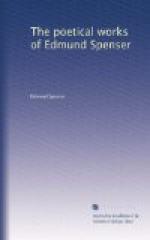XIV.
Long having deeply gron’d these visions sad,
I saw a citie like unto that same
Which saw the messenger of tidings glad,
But that on sand was built the goodly frame:
It seem’d her top the firmament did rayse,
And, no lesse rich than faire, right worthie sure
(If ought here worthie) of immortall dayes,
Or if ought under heaven might firme endure.
Much wondred I to see so faire a wall:
When from the Northerns coast a storme arose,
Which, breathing furie from his inward gall
On all which did against his course oppose,
Into a clowde of dust sperst in the aire
The weake foundations of this citie faire.
XV.
At length, even at the time when Morpheus
Most trulie doth unto our eyes appeare,
Wearie to see the heavens still wavering thus,
I saw Typhaeus sister* comming neare;
Whose head, full bravely with a morion** hidd,
Did seeme to match the gods in maiestie.
She, by a rivers bancke that swift downe slidd,
Over all the world did raise a trophee hie;
An hundred vanquisht kings under her lay,
With armes bound at their backs in shamefull wize.
Whilst I thus mazed was with great affray,
I saw the heavens in warre against her rize:
Then downe she stricken fell with clap
of thonder,
That with great noyse I wakte in sudden
wonder.
[* I.e. (apparently) Change or Mutability.
See the two cantos of the
Seventh Book of the Faerie Queene.]
[** Morion, steel cap.]
* * * * *
THE VISIONS OF PETRARCH:
FORMERLY TRANSLATED. [Footnote: The first six of these sonnets are translated (not directly, but through the French of Clement Marot) from Petrarch’s third Canzone in Morte di Laura. The seventh is by the translator. The circumstance that the version is made from Marot renders it probable that these sonnets are really by Spenser. C.]
I.
Being one day at my window all alone,
So manie strange things happened me to see,
As much it grieveth me to thinke thereon.
At my right hand a hynde appear’d to mee.
So faire as mote the greatest god delite;
Two eager dogs did her pursue in chace,
Of which the one was blacke, the other white.
With deadly force so in their cruell race
They pincht the haunches of that gentle beast,
That at the last, and in short time, I spide,
Under a rocke, where she, alas! opprest,
Fell to the ground, and there untimely dide.
Cruell death vanquishing so noble beautie,
Oft makes me wayle so hard a destenie.




